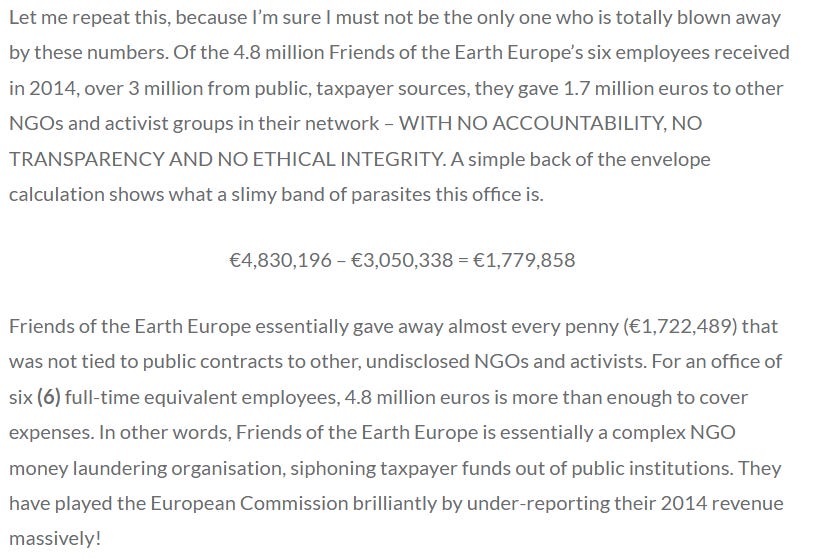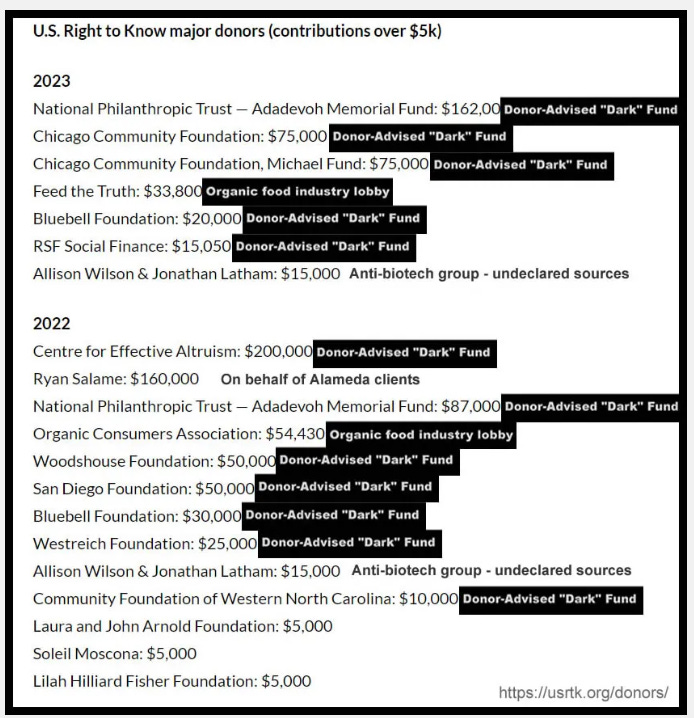Wish List for 2025
Scrutiny of NGO Funding
Have you noticed over the holidays that the clipboard brigade, with their panda or whale logos, no longer come up to you on street corners to chat with you about how nature is “under attack”? They are no longer trying to get your phone number so a telemarketer can chase you down for a donation. The reality is that they don’t need your money or hassle of your membership (and in reality, that fundraising method cost them more than they earned).
Environmental NGOs are no longer struggling on tight budgets fighting the good battle against high-paid industry lobbyists. NGO coffers are now overflowing with funds from foundations, government programs or interest groups. Activists are now paying off researchers, journalists and lawyers to promote their campaigns. But when it is time to scrutinize their funding, they raise hell and deflect the conversation to some of their case studies on industry funding (which actually pales in comparison).
This charade of double-standards has to stop. The first point on my wish list for 2025 is that NGO funding needs to go through the same scrutiny as industry funding. There are three points that need to be considered by policymakers.
1. Stop all Government Funding of NGOs
Why on earth are governments still funding NGOs? The practice is widespread, for example, in the European Union. At first, they funded umbrella groups (like European Environment Bureau, European Public Health Alliance or Health and Environment Europe) in order to redistribute the funds to smaller national NGOs to try to create a Europeanized activist space. Then, in the early 2000s, in the days of “stakeholder dialogue”, money was given to NGOs so they could participate in the policy dialogue process. Now they take the money but they only engage with other NGOs and use the funds to create mistrust in EU institutions and other stakeholders.
Why should governments stop giving taxpayer money to these loud, divisive minorities? Four reasons:
These activist groups have so much funding from foundations and interest groups that they are spending the excess on other NGOs (see my earlier exposé, quoted below, on how Friends of the Earth abuses public funding).
Secondly, the idea of giving taxpayer money to small activist groups to campaign against the same capitalist system that enables them seems, well, ridiculous.
Also, can NGOs legitimately fulfil their role as watchdogs if they are 100% funded by an institution they should be watching?
Finally, free money enables activists to assume that society can continue to function well without any productive or innovative inputs (everyone clicking PowerPoints in Brussels and Washington seem to think that money comes from nothing).
In May, the European Commission, which gives hundreds of millions of euros to NGOs, rightly stipulated that they will no longer fund activist groups for lobbying activities. But that is all the NGOs do. Earlier this month, two campaigners from Corporate Europe Observatory wrote an article complaining how unfair this was and that NGOs have a right to have European Commission funding to attack the European Commission. The sweet hypocrisy here is that at the end of the article, the authors state that their NGO does not accept government funding (so even they know there is something wrong with this practice they are fighting for on behalf of their activist brethren).
A key point on my 2025 Wish List is the end of the wasteful practice of throwing taxpayer money at activist groups who don’t deserve the time of day. Like the rest of us, let them work for their lunch.
2. Treat NGOs and Industry Under the Same Conditions as Stakeholders
The WHO is leading a campaign to isolate all industries that they deem “health harming” (from the food industry to pharmaceuticals to baby formula manufacturers) in the same way that the tobacco industry was denied any representative voice as a legitimate stakeholder. In a report published this year, they proposed, as an alternative, that more public funding be provided to NGOs to lead the policy debates. See the Firebreak series on why their tobacconization strategy is dangerous to public health and prosperity.
The idea that there are good actors and bad actors in the policy game is a manipulative distortion of the lobbying process. Every interest group has a point to put forward and has the same right to be heard. Activists have created sanctimonious groups like The Good Lobby or Corporate Europe Observatory to act as flanks, ensuring that competing positions are denigrated on moral grounds, to the point that any government regulators who even meet industry representatives is putting their career at risk. By clearing the room of opposition and by using a readily gullible media, these obstructionists can dominate the policy narrative and control the lobbying process. They may not have facts or science behind them, but activists have been able to win policy campaigns purely on moral posturing and the threat of righteous indignation.
In 2025, my wish is that the WHO will fail in its divisive Commercial Determinants of Health obstructionism and that regulators return to a more democratic policy process.
3. Abolish Dark Donor-Advised Foundation Funding
Foundations hide behind a veil of virtue, with a legacy reputation of building hospitals, feeding the poor and providing scholarships to the less fortunate. That may have been true 50 years ago, but today these sharks swim below the surface as agenda-driven campaign funders run by interconnected networks of political insiders. They fund (and thus, dominate) the media, activist scientists and NGOs, providing tens of millions to coordinate political actions in any policy issue. One of the tools they use to expand their influence, funding capacity and revenue streams are donor-advised funds.
Such funds allow interest groups to donate to a foundation and have it earmarked for a group to run a campaign in their favor. The donation is then redirected, in the name of the foundation which takes a commission (up to 10%) and protects the anonymity of the original funding source. This is not only legal, it is tax deductible. So tort law firms, for example, can fund glyphosate fear campaigns via foundation donor-advised funds in the same way that Gazprom could fund anti-nuclear groups and no one would know who was behind the original funding. It would be a perceived as a benign donation from a virtuous foundation committed to doing good.
Given the lucrative opportunities, most foundations now offer such services (and some dormant foundations from the 1930s, like the Fund for Constitutional Government, have been resurrected as donor-advised funds or fiscal sponsors). These insiders have been running complex funding webs to control and finance journalists as well.
NGOs, activist researchers, journalists and influencers have found an easy way to tap into vast amounts of funding without the need to be transparent. It has gotten so widespread that an NGO demanding industry transparency, US Right to Know, is almost completely funded by these dark, donor-advised funds. The activist NGO does not even recognize its own hypocrisy.
On my 2025 Wish List, I would like to see an end to the anonymity of donor-advised funds. Every earmarked donation must have its funding source made public.
As more activist groups are increasing their wealth exponentially, they will create more noisy campaigns, public outrage and division. As political processes reflect these divisions, debates will no doubt become more offensive and less transparent in 2025. Like 2016, Trump’s return to the White House will create unlimited opportunities for fundraisers.
The media has forgotten the key rule of lobbying: Follow the money. If any journalists were to look at how much money is sloshing around activist groups, their perception of how policies are being driven would instantly change. But to do that, the media would have to look at how they themselves are part of this money chain.
I am not under any illusion that my wish will come true in 2025. That is why the Firebreak will continue the lonely job of documenting and curating the corruption. It might be valuable to historians one day to help understand the factors behind the decline of Western prosperity.
Happy New Year!






